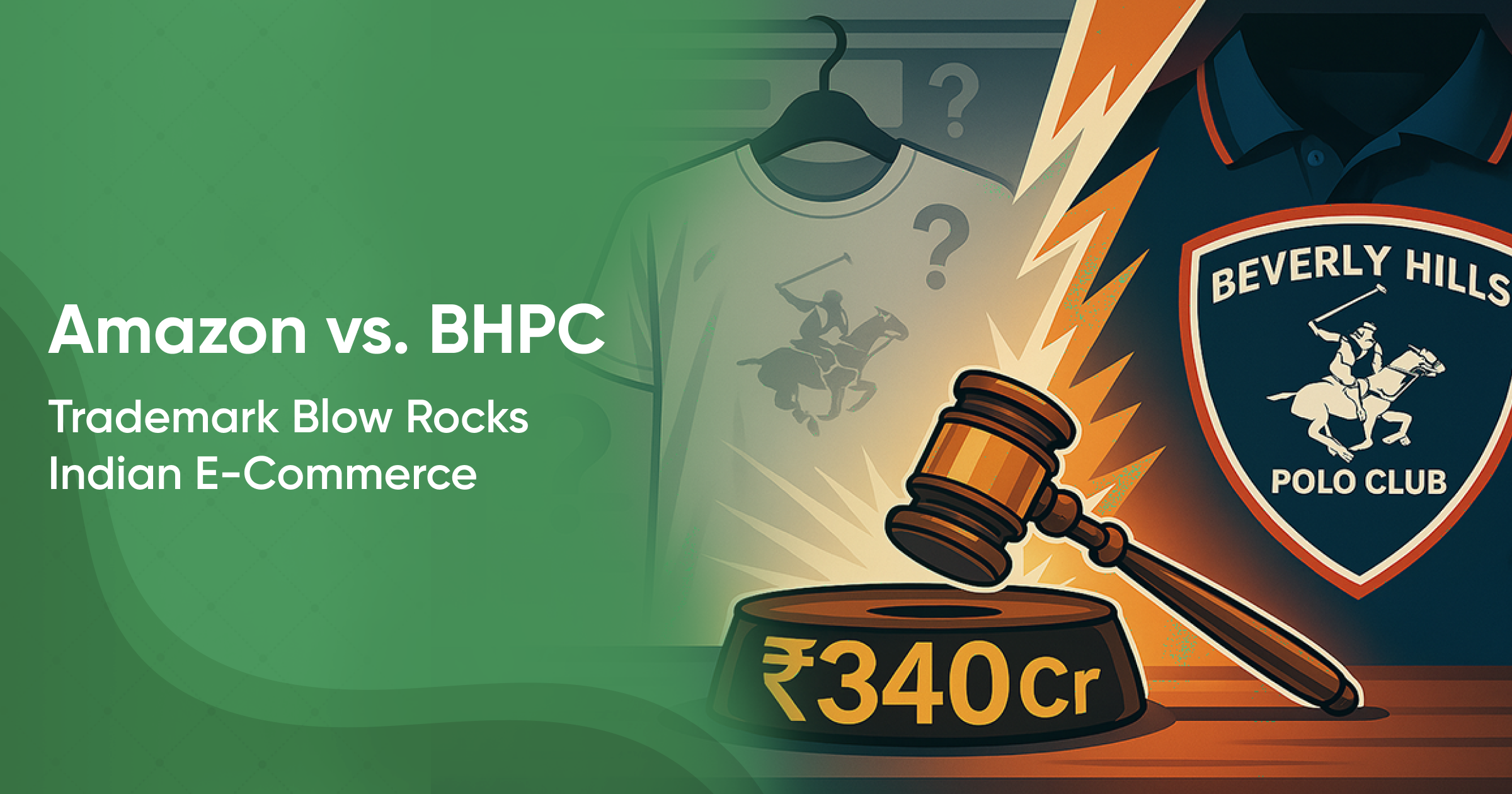The Delhi High Court ordered Amazon to pay ₹340 crore in damages for trademark infringement - one of the biggest IP verdicts in Indian history. The reason? Trademark infringement of the Beverly Hills Polo Club (BHPC) brand.
Yes, you read that right - ₹340 crore. One of the largest trademark verdicts in India’s history. It wasn’t a clerical error. It wasn’t an accident. The Court found Amazon guilty of deliberate infringement through its private fashion label - Symbol. And the message this sends to the business world is loud and clear: If you copy a registered brand - even as a big tech player - you pay the price.
This case isn’t just about money. It’s about accountability, brand identity, and the power of Indian IP law in the digital age.
What happened?
It started with a complaint by Lifestyle Equities CV - the registered owner of the Beverly Hills Polo Club (BHPC) trademark in India. They filed a lawsuit against Amazon Technologies Inc. Their claim? Amazon’s fashion label, Symbol, was selling clothes that looked almost identical to BHPC’s products. Same type of logo. Same equestrian theme. Same feel, look, and brand energy. Not a coincidence, they said. A calculated move to confuse buyers and ride on BHPC’s brand value. Amazon defended itself. They said they were just a platform, not the seller. But the Court looked deeper - and saw something else.
The Court ruled that:
- Amazon was not a neutral platform
- Symbol was Amazon’s own brand - created, controlled, and sold by them
- And the infringement was not accidental, but strategic and profit-driven
Amazon had full control over the brand. And it had crossed the line. The result? A staggering ₹340 crore in damages awarded to BHPC. A clear reminder that even global giants must respect trademark boundaries.
Why this ruling matters for Indian brands
This wasn’t just a routine verdict.
It was a legal turning point.
The Delhi High Court’s decision in the BHPC vs. Amazon case reshapes how trademarks are treated in the digital age - especially for businesses in e-commerce, fashion, and private labels.
Here’s what it means for Indian brands moving forward:
1. Private labels can’t hide behind “we’re just a platform”
Amazon owns Symbol, its in-house fashion label. That means Amazon wasn’t just listing someone else’s product. It was selling its own. And when that product copied another brand’s identity, the court didn’t hesitate. It held Amazon fully accountable.
That sets a strong precedent: If your private label copies another trademark - you can’t blame the platform. You are the platform. Whether you're a small D2C brand or a global giant, your label = your liability.
2. Safe harbour has limits now
India’s IT Act gives online platforms “safe harbour” protection. That means they’re not usually liable for user-generated listings. But this case draws a line. If you:
- Sell products under your own brand
- Control production or distribution
- Earn money from the copied design
Then you are no longer an innocent host. You’re an active player. And you're legally responsible. This tightens the net on e-commerce giants - and it also warns rising startups not to treat IP lightly.
3. Trademark dilution is no longer ignored
Infringement isn’t just about customer confusion anymore. The court recognized a more subtle - but serious - harm: trademark dilution. That’s when someone uses a famous mark in a way that weakens its identity or erodes its value, even if people don’t get confused.
In BHPC’s case, even if buyers didn’t mistake Symbol for the original brand, the value of BHPC’s mark was damaged. Now, that kind of harm is officially enforceable under Indian law. It’s a huge win for legacy brands - and a warning to anyone thinking of copying a famous name for quick gains.
What should Indian businesses learn from this?
Trademark protection doesn’t end the day you register your mark. You have to defend it - especially in the fast-moving world of e-commerce. Infringement today doesn’t wait. A copycat logo or a misleading listing can show up overnight and start pulling traffic away from your brand.
That’s why online brand monitoring isn’t optional. You need to regularly check marketplaces, search engines, and ad listings. Look out for sellers using your brand name, logos that resemble yours, or packaging and taglines that confuse your customers. Even tactics like keyword hijacking or duplicate SEO can quietly eat away at your visibility.
Why wait for damage when you can stop it early? Copycats thrive when no one’s watching. So don’t stay silent. Be loud. Be early. Be alert.
Run a trademark check before you launch anything
Launching a new product? Thinking of a fresh brand name or label? Before anything goes live, do a trademark clearance search. It’s one of the smartest steps you can take to avoid legal chaos down the road.
A quick search can help you find names that are already taken, identify lookalike trademarks that might land you in court, and guide you toward a brand identity that’s both unique and legally strong. The process is fast, affordable, and easy to do with the right support.
Skipping this step is like skipping insurance. Everything feels fine - until the lawsuit arrives. Don’t gamble with your brand’s future. Protect it from the start.
Collect proof and act fast if you spot infringement
If you see someone copying your brand - don’t ignore it. Gather evidence. Do it fast.
- Take screenshots
- Save URLs
- Record timestamps
- Archive listings
Then, contact a trademark attorney. A well-timed cease-and-desist letter can stop the damage before it spreads. Wait too long, and the copycat might grow roots. Act early, and the law is on your side.
When a brand speaks, the law listens
The Amazon-BHPC case wasn’t just a courtroom win. It was a message - clear, direct, and impossible to ignore. A global tech giant was held accountable. A legacy brand defended its identity. And India’s trademark law showed it has real teeth - even in the digital world. This ruling changed how courts look at online infringement. Private labels can’t hide behind big platforms. Safe harbour has limits.
And yes - trademark dilution is now a real, recognized harm.
For Indian businesses, it’s a warning and an opportunity. Protect your name. Watch your logo. Run clearance checks. And if someone copies you, act fast. Your brand is more than a name - it’s your story, your trust, your value in the market.
Need help protecting that value? At Trademarkia, our
experienced trademark attorneys
help brands like yours stay safe and strong. We guide you through filings, brand monitoring, and legal enforcement - in India and worldwide. Whether you’re launching your first logo or expanding your empire, we’re here to help you do it the right way. Your brand. Protected globally. Powered by Trademarkia.

